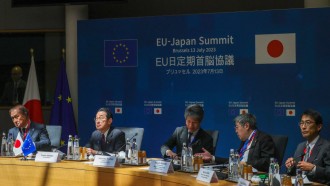
As others seemingly drop the ball on content protocols, Pinterest remains ahead of the curve, maintaining a bullish stance against misinformation and disinformation in all of its varied forms. The platform, which is home to image boards and advanced sharing tools, has updated its internal policies specifically surrounding climate misinformation, including even on the grounds of marketing.
Pinterest's updated community guidelines now feature in-depth policies surrounding climate change information, patting itself on the back by citing it "makes Pinterest the only major digital platform to have clearly defined guidelines against false or misleading climate change information." The social media site has also updated its advertising guidelines to fit in with these newly altered content rules.
The altered guidelines come on the heels of the UN's most recent report on CO2 emission levels, which highlights an ever-dire need to curb our gas emissions within the next three years. The report wasn't utilized specifically for Pinterest's new policies but highlights the increasing need to focus our efforts on stamping out conspirators and wrongful accusations surrounding the main point of impending environmental catastrophes.
Related Article: Pinterest Announces $1.2M Expansion to its Creator Fund Program for 'Underrepresented Creators'
Pinterest's four main facets to the new climate change rulesets on content removal are as follows:
- Denial of climate change, its impacts, scientific merits, and human influences.
- "Cherry-picking" of varied climate change content to fashion untrustworthy scientific data into facts.
- Misleading information on weather and natural disasters.
- Misleading information on curtailing climate change.
Pinterest is also angling its new policies towards ads, focusing primarily on "conspiracy theories, misinformation, and disinformation related to climate change." These marketing guidelines were made in conjunction with various groups with extensive knowledge of climate change, specifically the Conscious Advertising Network and the Climate Disinformation Coalition.
Pinterest clearly isn't messing around with how best to go about climate change misinformation in its user-created content. As the social media site stays at the forefront of emphasizing better community guidelines, similar services remain slow to adapt.
For YouTube, monetization is the highest constraint, with creators losing out on the ability to make money from their videos that feature misinformation around climate change. On the other hand, Facebook simply stamps down on the reach of misinformation by labeling it as such but doesn't enforce any specific rules to combat the creation of content surrounding it.
As the world grows more and more reliant on varied online services, focusing on guidelines for user-generated content is undoubtedly a must, especially in this age of information. With so much coming at us all at once, it's incredibly difficult to filter out the content that's unreliable. Thus, having more secure and all-encompassing protocols surrounding the spread of mis and disinformation is of utmost importance.
Read Also: Pinterest Stock Grew by 28% Following Q4 Earnings and Sales Beating Wall Street Expectations





